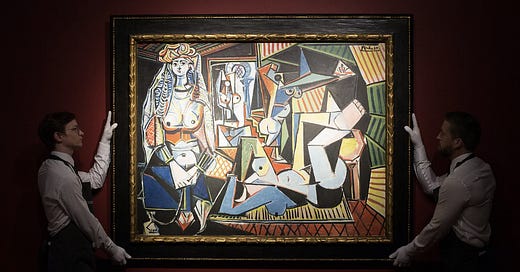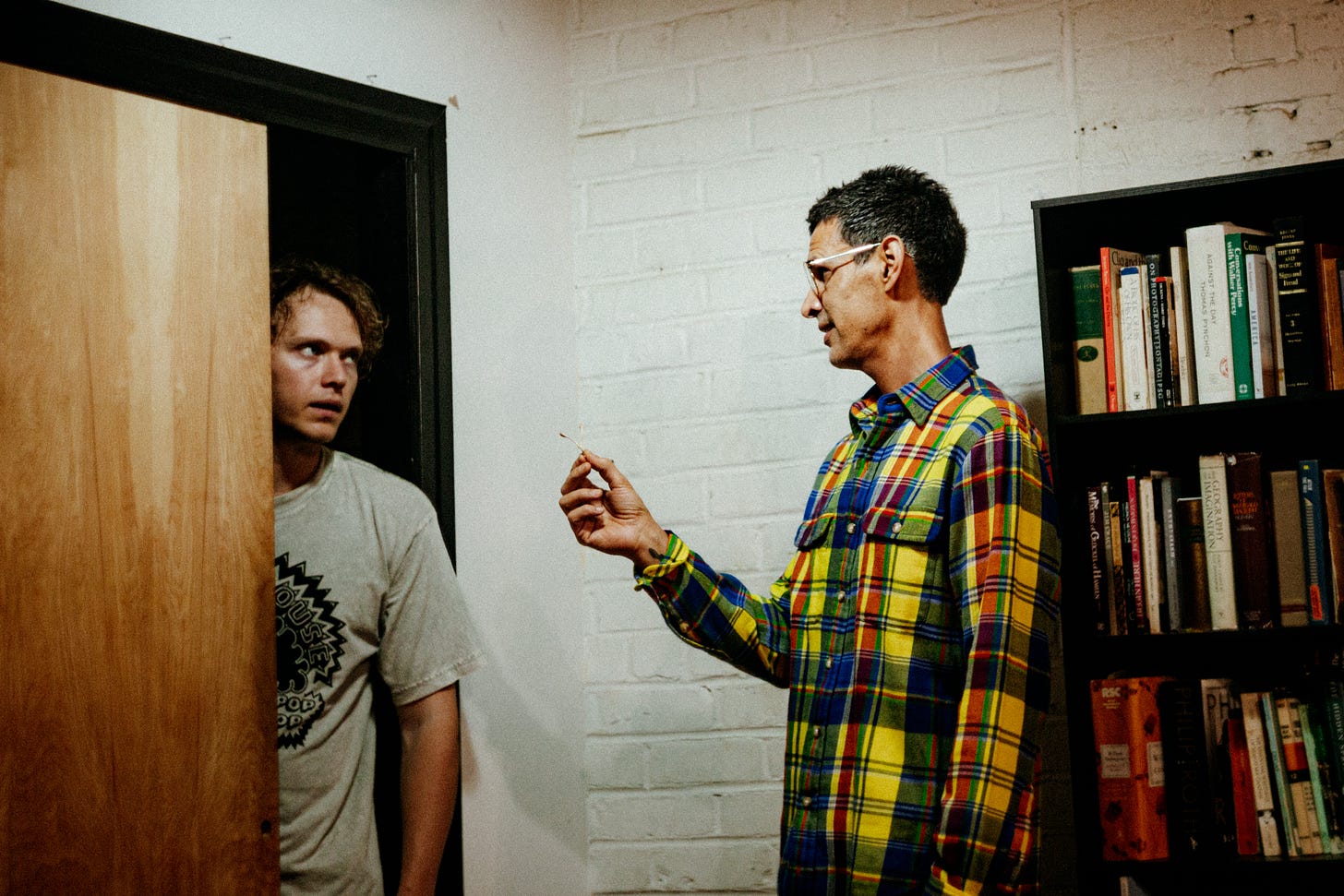Art vs. Commerce: Round Infinity
A bohemian filmmaker and an artsy investor collide in Robin Schavoir's 'The Jag'

There’s a feeling you get sometimes in the first few minutes of a play. Certainly, the build-up to that moment was exhilarating. Weeks ago, you bought a ticket. Maybe you invite a friend or two as well. What a cultured evening you have planned! If it’s on Broadway, how classy! If it’s in some converted shed, how bohemian! Either way, you are proudly saying “fuck you” to these modern times where many don’t even have the attention span to watch TV.
Then the lights dim. The first scene begins. It morphs into the second. You realize you’ve got over an hour until intermission. You start thinking, ‘Beer or wine?’ You wish the seats were as comfy as the ones at your local AMC.
But not with Robin Schavoir’s The Jag, a play that captured my attention from very early on. Why exactly so, I still can’t quite explain. The Jag’s premise is neither flashy nor new, mostly centering on a roommate clash. Tyler is a filmmaker, presumably in his mid-to-late 20s. From Bushwick, he travels to a friend’s country house in the Catskills, where he is to spend three days finishing his screenplay. Also at the house is Brian, a middle-aged, retired investor who wants to devote more time and resources to being a patron of the arts. A local resident, Cori Elizabeth, is studying to become a nurse, and also used to date Tyler.
I don’t want to spoil the play for those who may see it, so if that’s you, all you need to take away from this piece is that you should watch this play, which runs until July 6th at the Brooklyn Center for Theater Research.1 The Jag hooks your attention because it’s taut with humour and malice, and free of easy, flattering answers. Is it siding with art or with commerce? Does it pump up or ridicule Bushwick bohemians? Does it feel sorry for or loathe rich go-getters? Are these characters actually all undead?
Much credit to the actors (Gilles Geary as Tyler, Giovanna Drummond as Cori Elizabeth, and Mickey Solis as Brian) and director (Paul Felton) as well. I especially liked Mr. Solis’ performance as he turned a character who could be easily lampooned into a surprisingly sympathetic figure (coincidentally, he also looks like a roommate I once had, with whom my relations deteriorated). The energy between Mr. Geary and Ms. Drummond was particularly excellent, too.
Spoilers below
I went to see the press preview with my friend Trevor, and afterwards, on our way to the bar and over drinks, we kept on discussing what we’d just watched. We both agreed that what really worked about The Jag is that neither Tyler nor Brian, nor the philosophies they represent, are presented as the obvious superior to the other.
In the climax, once their mutual respect for one another has completely disappeared, Tyler and Brian rip into each other. Tyler, fed up with Brian’s uptightness and frequent giving of unsolicited advice, taunts Brian by saying that the world ultimately doesn’t like or remember the wealthy. He concedes he may be a mooch, but so were Buddha and Mozart and Whitman and Wilde. Brian mostly laughs this off—as does most of the audience, which speaks highly of Schavoir’s restraint in not blatantly tilting the playing field in favour of fellow artists—but in a previous scene, in front of Cori Elizabeth, he attacks Tyler as lazy, dishonest, entitled, and as a result, doomed to fail.
Both characters have legitimate points. Why can’t Brian just be chill for a minute, whether it’s about polishing the kitchen floor or living up to your potential, especially with a stranger whom he’ll only know for a few days? Regarding whether the world truly values art or money more, the fact is that Brian has made his fortune and now wants to pursue a life like Tyler’s. In contrast, should Tyler ever become a successful filmmaker, he would never go into finance.
One even gets the sense that deep down, Brian is envious of Tyler, which is why he feels the need to constantly bully Tyler into agreeing with his own life philosophies about articulating concrete goals and pursuing them with utmost diligence. To make things worse, despite his financial success and looks—the text describes Brian as “handsome-ish (at least not ugly)”—Brian has not been successful with women. It must not sit well with Brian that a loafer like Tyler is nevertheless mired in romantic entanglements (including possibly with Heather, the owner of the country house and the woman whom Brian is pursuing).
But Brian isn’t just some bitter loser who resents the free-spirited and free-loving young artist. For all of Tyler’s rants against capitalism, not only does he seem to come from some wealth/status, but he also has classist pretensions. He’s reluctant to commit to Cori Elizabeth because she’s “undereducated” and being with someone like her is “not what [his] family wanted.” As for his lofty attitudes about art, his only work seems to be a 12-year-old unfinished screenplay. There’s no evidence he does more than just LARP as a filmmaker, enjoying the social standing that gives him in his gentrified Brooklyn circles as part of a young metropolitan nobility.
My friend Trevor also pointed out how Tyler, despite his clowny earnestness, does have a legitimate point about how the Brians of the world can only appreciate great artists after they’re dead.
This is exemplified in another climactic scene, where Brian lets Cori Elizabeth wait in the house for Tyler before their date. As usual, Brian is polite at first. He even listens to Cori Elizabeth talk about why she wants to become a nurse and he commends her for her noble intentions. But even there, he is reflexively judgmental, even if it’s in a positive sense. And soon enough, he’s opining about what’s wrong with Tyler, which causes Cori Elizabeth to defend him. As tempers flare, she challenges Brian to sell his Jag, which she estimates is only “point zero five of [his] net worth” to fund Tyler’s movie and help art and humankind.
Brian has a very funny retort to all this, which again attests to Schavoir’s even-handedness. But the exchange does raise the question of whether Brian would be able, or even willing, to recognize great art when such art hasn’t already been anointed to respectability by the proper authorities.
Cori Elizabeth provides an enlightening contrast to Tyler and Brian as someone who is excluded altogether from this elitist bickering about who counts as an artist and who’s condemned to be a normie. There are moments where she shows her appreciation of culture and fine things. But unlike Tyler, she isn’t free to pursue a bohemian Bushwick lifestyle. And unlike Brian, she doesn’t drive around in a luxury car (the titular Jaguar) to art collector’s exhibits and film festivals. In a closing monologue, she laments how Tyler ultimately just sees her as a “dumb slut whose only skill was giving head and having adventures,” and how she’s destined to just be a small-town nurse.
On one hand, her downer of a monologue can be criticized as snobby. What’s wrong with being a small-town nurse? Why does everyone need attention all the time? But you’re reading this on Substack (you may even be a writer yourself!), where everybody is clamouring for attention. I’m certainly here, demanding not be relegated to NPCdom. The underlying message of The Jag is that none of its characters are true artists: Tyler plays at being one, Brian wants to buy his way in, and Cori Elizabeth can’t even aspire to be one.
Instead, art in The Jag functions mainly as a status marker, which is nothing new in history. But the danger of abusing art as a class divider, and even as a determinative factor in whose lives are more valuable than others, is especially fraught now with factors like AI and cultural hyper-centralization (e.g. how national US politics not only take over local American politics, but even international local politics) tanking the perceived importance of individual human lives.
In an automated and crowded world, the artist becomes the supreme being, and the fight to be one becomes more vicious and desperate than ever before.2 On the other side is the tech class, long having felt sneered at by the artists (maybe even secretly yearning to join them or having been rebuffed), gleefully programming that cohort into obsolescence with each new iteration of generative AI models.
That must be why The Jag has an eerie quality about it, further fostered by the fact that it enticingly leaves many details unexplained. Such as Heather, who never appears. Is she even real? Where does Brian disappear to in the end? If we live in a world where only artists can have souls, then all the characters in The Jag are ghosts, clawing for their place in the afterlife.






It was great. Brian fixing his tie mischievously while Tyler was yelling at him hysterically had me seriously cracking up.
This seems like a pretty cool play! Similar vibes to Yasmina Reza's "Art" (which is getting a Broadway revival which sounds great until you look at the cast... oof...)